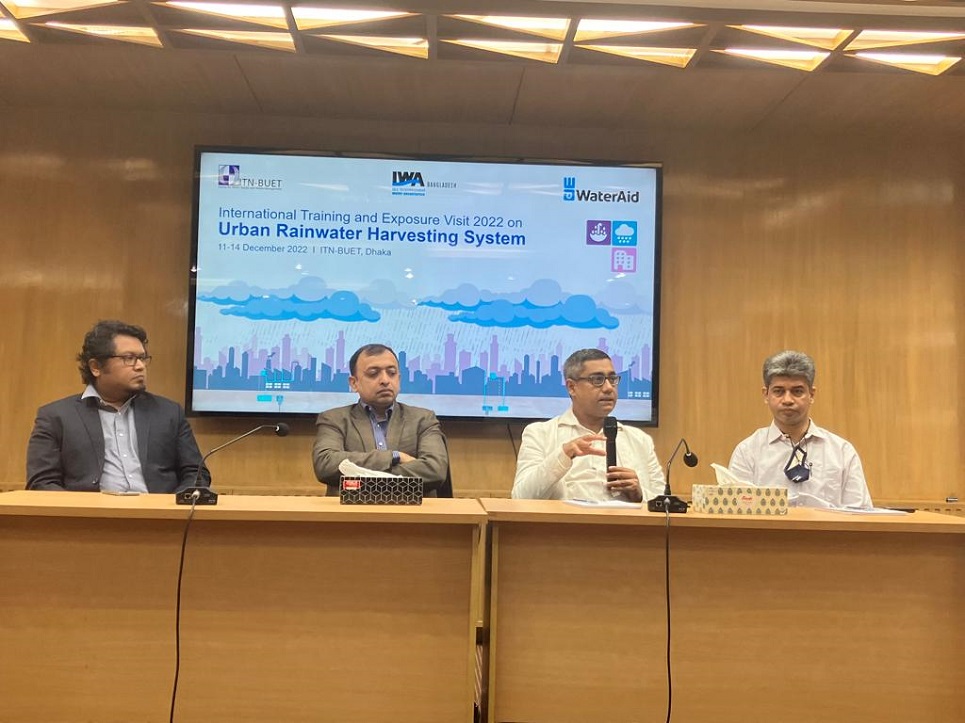Staff Correspondent
Published:2022-12-13 18:56:49 BdST
‘Rain harvesting may be helpful to face water crises’
The rain water harvesting may play a big role in resolving emerging water crisis in the country created due to climate change and increasing population, said experts.
“The rain water harvesting system gives an affordable nature based solution to emerging water crisis that is created due to climate change, urbanisation and increase in population,” Prof Dr Tanvir Ahmed, Director of ITN-BUET said.
Tanvir Ahmed, also Professor of Civil Engineering Department of BUET came up with the statement while speaking at a training programme titled ‘training and exposure visit 2022 on urban rainwater harvesting system’ at the ITN-BUET conference room at BUET in the capital on Sunday.
WaterAid Bangladesh in collaboration with International Training Network Centre, BUET (ITN-BUET) and International Water Association (IWA) Bangladesh organised the programme. The training programme started on December 11 and will continue till December 14.
International Water Association (IWA) Bangladesh chapter member secretary Mohammad Zoabir Hasan, also Deputy Executive Director (DED) of Development Organisation of the Rural Poor (DORP) said the rain water harvesting system is essential for the country, especially coastal areas of Bangladesh where people are experiencing acute fresh water crisis due to salinity.
Engineers, architects, environmentalists, industrialists, urban planners, academicians, policymakers and development practitioners from relevant fields participated in the programme.
The participants will get the opportunity to learn from national and international technical experts, academicians and professionals who have experience in implementing RWHS.
The participants will have exposure to and a better understanding of urban water challenges and importance of rainwater harvesting, principles of rainwater harvesting and its components, planning and designing of rainwater harvesting and groundwater recharge system, simplified cost-benefit analysis of rainwater harvesting, water safety plan and LEED certification and practical rainwater harvesting focusing on water retain, reuse, and recharge (3R).
Rainwater harvesting system (RWHS) provides a cost-effective and practical nature-based solution to address the emerging water crisis due to climate change and rapid population growth in urban context.
Bangladesh National Water Policy 1999 recognises rainwater as the third source of water. In urban areas, rainwater can be used for flushing toilets, watering gardens, washing cars and floors, and other non-potable purposes, thereby reducing dependency on existing water supply sources.
At the same time, rainwater harvesting can reduce the pressure on urban drainage system and avoid urban water-logging. With increasing industrial water demand, it can be an alternate water source.
To meet international buyers' compliance requirements and maintain factory standards, RMG factories are encouraged to install RWHS in their premises, and the water can be used for industrial production and groundwater recharge.
Many initiatives and programmes have recently been promoting rainwater harvesting systems in urban and industrial buildings. Incorporating rainwater management as a separate chapter in the Bangladesh National Building Code (BNBC) 2020 emphasises its significance.
Practitioners, planners, academicians, industrialists, students, researchers, and policymakers working on water and environmental issues need to be sensitised and capacitated to tackle water crisis and ensure future water security.
Unauthorized use or reproduction of The Finance Today content for commercial purposes is strictly prohibited.


